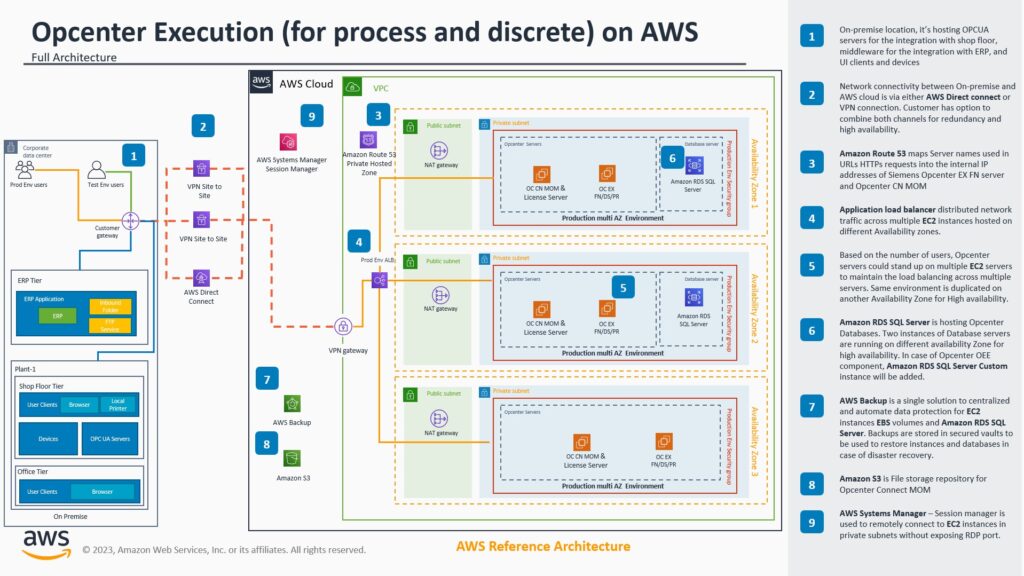Cloud-based MES: Opcenter Execution for process and discrete industries on AWS

Manufacturing Execution Systems (MES) in manufacturing have transformed from rigid to modular, offering flexibility and adaptability. Cloud-based MES systems take it further, providing accessibility, scalability, and real-time data analysis. Manufacturers can make informed decisions anytime, anywhere, without infrastructure limitations or costly upgrades.
Main challenges to cloud-based MES
The main challenges to running Manufacturing Execution Systems (MES) on the cloud include network latency, availability concerns, organizational culture transformation, security and compliance issues, and cost considerations. Optimizing hardware capacity and resource usage is necessary to control the cost of a cloud solution, and organizations must implement effective resource management strategies to adjust resource allocation based on demand.
Deploying cloud-based MES solutions may incur additional charges related to network usage, public IP addresses, and data transfer, so careful planning and cost-saving options are essential. When using SaaS solutions, organizations risk losing control over software updates, so clear communication channels with the cloud provider and thorough testing are important. Network latency and performance may be affected when transitioning to a cloud-based deployment, so a reliable network provider and cloud infrastructure are crucial. Ensuring full availability requires a cloud provider with redundant infrastructure in different geographical locations. Security and compliance concerns can be addressed by implementing strong encryption measures, deploying digital certificates, and establishing a dedicated network infrastructure.
Opcenter Execution delivers critical benefits for process and discrete industries
Implementing a cloud-based MES optimizes the Total Cost of Ownership (TCO) by offering transparent pricing and cost savings. Opcenter Execution delivers accelerated time-to-value, enhanced visibility, and agility across manufacturing operations. Leveraging cloud native services reduces IT effort. Installation is easier with AWS reference architectures and CloudFormation scripts. Scaling is flexible, and data is democratized for real-time visibility. AI and ML services improve efficiencies and optimize inventories. It also enables transparency and traceability in response to market demands and regulatory changes.
Delivering Cloud-based MES: Opcenter Execution architecture on AWS
Opcenter Execution on the cloud is operated on the AWS infrastructure, ensuring high availability and scalability. It is designed to span multiple availability zones, providing robustness and resilience. Siemens has implemented a comprehensive migration strategy, not only investing in Opcenter Execution on AWS but also leveraging AWS native services for a more efficient integration.
Opcenter Execution on AWS addresses the main challenges of cloud adoption in several ways. It reduces infrastructure setup efforts and costs by utilizing automated AWS reference architectures. The Lift & Shift approach ensures that customers have full control over software changes, minimizing risks and disruptions. It is also certified to run on AWS Outposts, which minimizes network latency in shop floor integration.
The out-of-the-box AWS reference architectures for Opcenter Execution include deployment over multiple availability zones, ensuring full availability at the infrastructure level. Security and compliance are prioritized with full encryption of communication layers, secure VPNs, and options for network segmentation, firewalls, and intrusion detection systems.

Conclusion
AWS’ scalability and availability are pivotal features that empower organizations to create resilient and flexible applications in the cloud. Facilitated by services like Amazon EC2 Auto Scaling, scalability allows seamless adjustment of computing resources based on demand, optimizing performance and cost-effectiveness. AWS achieves high availability with a redundant infrastructure across multiple data centers (availability zones), minimizing the risk of downtime. Services such as Amazon S3, Amazon RDS and Application Load Balancer contribute to a robust architecture, ensuring applications remain accessible and responsive, fostering business continuity and enhancing customer satisfaction.
Learn more about Siemens’ cloud-based MES in our white paper:


